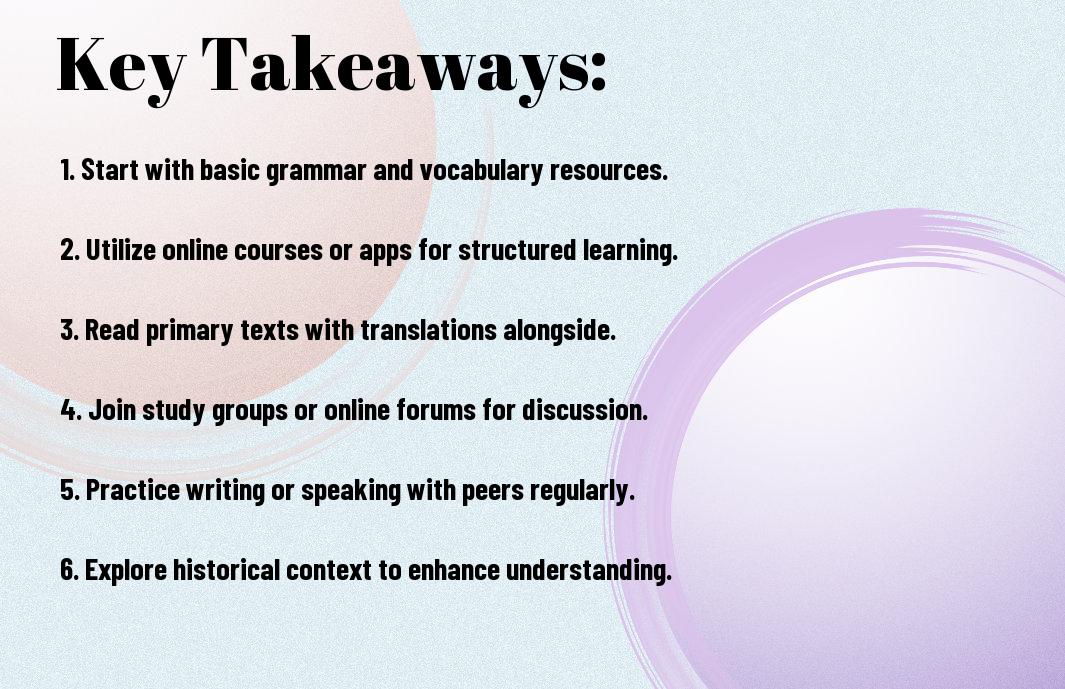As you probe into the world of ancient civilizations, you may find yourself fascinated by the languages that once flourished. You can uncover the secrets of these long-lost tongues, and your journey begins with a willingness to learn. You will explore the unique challenges and opportunities that come with studying ancient or dead languages, and you will discover the methods and resources available to help you achieve your goals, enabling you to decipher and understand the languages of the past.
Key Takeaways:
- Start by learning the alphabet and writing system of the ancient or dead language, as this will provide a solid foundation for further study.
- Immersion is key when learning an ancient or dead language, so try to surround yourself with as much written and spoken material as possible, such as texts, audio recordings, and videos.
- Focusing on grammar and syntax is crucial when learning an ancient or dead language, as these languages often have complex sentence structures and verb conjugations.
- Practice actively by translating texts, writing in the language, and engaging in conversations with others who are also learning the language.
- Utilize language learning tools and resources, such as dictionaries, textbooks, and online courses, to aid in the learning process and provide support and guidance.

Choosing a Language
For the purpose of learning an ancient or dead language, you will need to select one that aligns with your interests and goals.
Factors to Consider
Against the backdrop of numerous options, you should weigh factors such as your motivation, the availability of resources, and the language’s complexity, considering:
- the difficulty level
- the amount of time you can dedicate
- your learning style
. Knowing your strengths and weaknesses will help you make an informed decision.
Popular Ancient and Dead Languages
Linguistically, you may be drawn to languages like Latin, Ancient Greek, or Sumerian, which have had a significant impact on modern languages and cultures.
Hence, as you explore these options, you will find that each language offers a unique window into the history and customs of its respective civilization, allowing you to gain a deeper understanding of your chosen language and its significance in the modern world, and you can choose the one that best fits your interests and learning objectives.

Resources and Materials
Assuming you have set your goals and chosen the ancient or dead language you want to learn, your next step is to gather the necessary resources and materials to aid in your learning journey. You will need a combination of textbooks, language courses, and online communities to support your progress.
Textbooks and Language Courses
To begin, you should look for textbooks and language courses that cater to your learning style and goals. You can find a wide range of textbooks and courses online, covering various aspects of the language, including grammar, vocabulary, and syntax.
Online Communities and Forums
Between the numerous online platforms and forums available, you can connect with other learners and experts in the field, facilitating your learning process. You can engage in discussions, ask questions, and share your progress with like-minded individuals.
Considering the vast array of online communities and forums dedicated to ancient and dead languages, you can explore different options to find the ones that best suit your needs. You can participate in online discussions, join language exchange programs, and access a wealth of resources, including language learning blogs, videos, and podcasts, to enhance your learning experience.
Learning the Basics
All language learners face challenges when starting to learn ancient or dead languages. You can find helpful resources by visiting forums, such as the discussion on Best way to learn Dead Languages?, to get tips from experienced learners.
Grammar and Syntax
Along the way, you will discover that understanding grammar and syntax is key to learning any language, including ancient ones, and you will need to probe into the specific rules governing your chosen language.
Vocabulary Building
Above all, you should focus on building your vocabulary, as it will be the foundation of your language skills, and you can start by learning common words and phrases used in your target language.
Syntax plays a significant role in your vocabulary building process, as you need to learn how to use words in context, and you will find that mastering syntax helps you to express yourself more effectively in your target language.
Immersion and Practice
After grasping the language fundamentals, you can dive deeper by visiting learning strategies for dead languages to find the best approach for you.
Reading and Listening
By engaging with ancient texts and audio recordings, you’ll become familiar with the language’s rhythm and syntax, helping you to better understand its structure and nuances.
Writing and Speaking
Above all, practicing writing and speaking will help you to internalize the language, making it a part of your daily routine and thought process.
With consistent practice, you’ll start to think in the language, and your writing and speaking skills will improve dramatically, allowing you to express yourself more confidently and accurately in the ancient or dead language you’re learning.
Overcoming Challenges
Many learners of ancient or dead languages face obstacles that hinder their progress, but with persistence and the right approach, you can overcome them and achieve your goals.
Common Difficulties and Solutions
Complexities arise when dealing with unfamiliar scripts, grammatical structures, and limited resources, but you can find solutions by seeking guidance from experts, utilizing online resources, and practicing consistently.
Staying Motivated
Amidst the challenges, you may feel discouraged, but maintaining your motivation is key to success, and you can do this by setting achievable goals, celebrating small victories, and connecting with a community of fellow learners.
At this stage, it’s imperative to evaluate your progress, identify areas that need improvement, and adjust your learning strategy accordingly, and as you continue on your journey, you’ll find that your motivation grows, and your confidence in your ability to learn an ancient or dead language increases, allowing you to tackle even more complex texts and explore the rich cultural heritage associated with your chosen language.
Advanced Learning
Despite your progress, you’ll need to dive deeper into the language. Consider:
- immersion through native texts
- analyzing grammar and syntax
Language Aspect Learning Strategy Reading Practice with native texts Specialized Topics and Subjects
The next step involves exploring topics like dialects and regional variations, helping you refine your understanding of the language.
Using Technology to Aid Learning
Around the time you’re advancing, you’ll find online resources, like language learning apps and forums, to be incredibly helpful.
Consequently, you’ll be able to access a wealth of information, including podcasts, videos, and online courses, tailored to your learning style and pace, allowing you to make significant progress in your journey to learn the ancient or dead language.
Final Words
Drawing together the various threads of learning an ancient or dead language, you will find that consistent practice and dedication are key to unlocking your understanding. As you examine deeper into your studies, your knowledge and appreciation of the language will grow, allowing you to decipher intricate texts and converse with others who share your interest. With persistence and the right resources, you can master even the most complex ancient languages.
FAQ
Q: What are the best resources for learning ancient or dead languages, such as Latin or Ancient Greek?
A: To learn ancient or dead languages, utilize textbooks, language learning software, and online courses specifically designed for these languages. Additionally, joining online forums or communities dedicated to the study of ancient languages can provide valuable support and exchange of knowledge. Many universities offer courses or have online resources available for the study of ancient languages, which can be a good starting point. Furthermore, practice reading ancient texts in their original form as much as possible, as this will help in gaining a deeper understanding of the language’s grammar, syntax, and vocabulary.
Q: How can I immerse myself in an ancient or dead language to improve my proficiency?
A: Immersion in an ancient or dead language involves consistent exposure to and practice with the language. Start by dedicating time each day to study, even if it’s just for a few minutes. Listen to audio recordings of native speakers (if available) or scholars reading ancient texts aloud. Try to find language exchange partners or tutors who can converse with you in the target language. Moreover, translating texts from the ancient language into your native language and vice versa is an effective way to improve your comprehension and retention. Engaging with the cultural context of the language, such as studying the history, art, and literature of the period, can also enhance your understanding and appreciation of the language.
Q: What strategies can I use to overcome the challenges of learning ancient or dead languages, such as unfamiliar scripts or limited resources?
A: Overcoming the challenges of learning ancient or dead languages requires patience, persistence, and the right strategies. Begin by familiarizing yourself with the script or alphabet of the language, practicing writing and reading it regularly. Break down complex texts into smaller, manageable parts, and focus on understanding the grammar and syntax rules. Utilize available dictionaries, lexicons, and commentaries to aid in comprehension. For languages with limited resources, seek out scholarly articles, academic papers, andbooks that can provide deeper insights. Moreover, creating flashcards for new vocabulary and using the spaced repetition technique can help in memorizing words and phrases. Lastly, setting achievable goals and tracking progress can help maintain motivation throughout the learning process.


